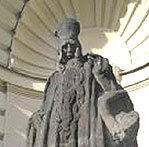 An Open Letter to University Presidents
An Open Letter to University Presidents


4 min read
11 min read
4 min read
2 min read
 Yahrtzeit of Rabbi Yehuda Loew (1525-1609), the famed Maharal of Prague. Maharal was born in Poland, on the night of the Passover Seder, to a distinguished family of rabbis that traced its ancestry to King David. He served as rabbi of Nikolsburg, Posen and then Prague. Maharal embodied a unique blend of classic Talmudic scholarship with deep kabbalistic insights. A prolific author, his works include a major commentary on the Five Books of Moses, volumes on Passover, on exile and redemption, and on character development. Perhaps the most famous legend surrounding Maharal is that he employed kabbalistic incantations to create a Golem, a robot-like being that was to defend the Prague ghetto from anti-Semitic attacks. The account is most likely apocryphal, but it gained popularity and is cited as the source for Mary Shelley's Frankenstein. Today a statue of Maharal stands in Prague, and his synagogue in Prague, the Altneushul, is still in use.
Yahrtzeit of Rabbi Yehuda Loew (1525-1609), the famed Maharal of Prague. Maharal was born in Poland, on the night of the Passover Seder, to a distinguished family of rabbis that traced its ancestry to King David. He served as rabbi of Nikolsburg, Posen and then Prague. Maharal embodied a unique blend of classic Talmudic scholarship with deep kabbalistic insights. A prolific author, his works include a major commentary on the Five Books of Moses, volumes on Passover, on exile and redemption, and on character development. Perhaps the most famous legend surrounding Maharal is that he employed kabbalistic incantations to create a Golem, a robot-like being that was to defend the Prague ghetto from anti-Semitic attacks. The account is most likely apocryphal, but it gained popularity and is cited as the source for Mary Shelley's Frankenstein. Today a statue of Maharal stands in Prague, and his synagogue in Prague, the Altneushul, is still in use.
On this date in 1952, Israel agreed to accept reparation payments from Germany for losses caused by the Nazis during World War II. As early as 1943, Jewish groups had begun to formulate demands for a postwar settlement that would include billions of dollars of indemnity for stolen or destroyed Jewish property (real estate, art, gold), plus payments for slave labor, and reparations for the loss of Jewish life. The 1945 Paris Conference on Reparations chose to ignore the Jewish demands. However, in 1951, German Chancellor Konrad Adenauer, who viewed Jewish reparations as part of the burden of guilt that Germans needed to confront, offered payments to Holocaust survivors. In Israel, Menachem Begin led the movement against accepting the reparations, arguing that they would somehow "absolve" Nazis of their heinous crimes. Over the years, German companies like Volkswagen, Deutsche Bank and Daimler-Benz have admitted to using slave labor during the war, and set up a fund to compensate workers. In the 1990s, it was revealed that Swiss banks were complicit in the Nazi effort to hide and sell stolen loot, and had engaged in the large-scale theft of deposits made by Jews. After some hesitation, Swiss banks announced their intention to create a fund for Holocaust victims.
